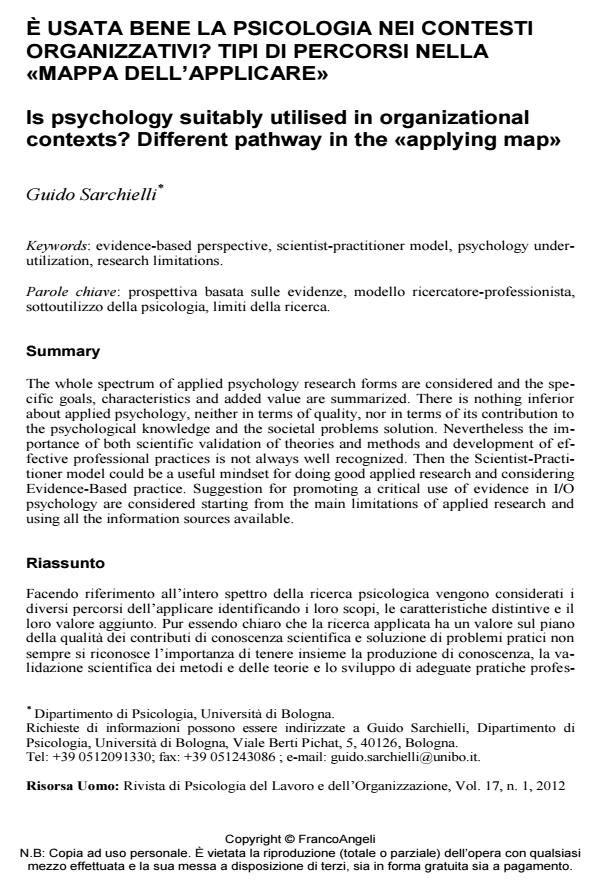Is psychology suitably utilised in organizational contexts? Different pathway in the «applying map»
Journal title RISORSA UOMO
Author/s Guido Sarchielli
Publishing Year 2014 Issue 2012/1
Language Italian Pages 7 P. 11-17 File size 612 KB
DOI 10.3280/RU2012-001003
DOI is like a bar code for intellectual property: to have more infomation
click here
Below, you can see the article first page
If you want to buy this article in PDF format, you can do it, following the instructions to buy download credits

FrancoAngeli is member of Publishers International Linking Association, Inc (PILA), a not-for-profit association which run the CrossRef service enabling links to and from online scholarly content.
The whole spectrum of applied psychology research forms are considered and the specific goals, characteristics and added value are summarized. There is nothing inferior about applied psychology, neither in terms of quality, nor in terms of its contribution to the psychological knowledge and the societal problems solution. Nevertheless the importance of both scientific validation of theories and methods and development of effective professional practices is not always well recognized. Then the Scientist-Practitioner model could be a useful mindset for doing good applied research and considering Evidence-Based practice. Suggestion for promoting a critical use of evidence in I/O psychology are considered starting from the main limitations of applied research and using all the information sources available.
Facendo riferimento all’intero spettro della ricerca psicologica vengono considerati i diversi percorsi dell’applicare identificando i loro scopi, le caratteristiche distintive e il loro valore aggiunto. Pur essendo chiaro che la ricerca applicata ha un valore sul piano della qualità dei contributi di conoscenza scientifica e soluzione di problemi pratici non sempre si riconosce l’importanza di tenere insieme la produzione di conoscenza, la validazione scientifica dei metodi e delle teorie e lo sviluppo di adeguate pratiche professionali. Il modello Scientist-Practitioner può costituire un utile framework per integrare le nuove prospettive derivanti dalla pratica basata sulle evidenze. Vengono forniti suggerimenti per affrontare criticamente tale prospettiva nell’ambito della Psicologia del lavoro e dell’organizzazione, partendo dal riconoscimento dei limiti delle ricerche e dall’uso integrato di tutte le fonti informative disponibili.
Keywords: Evidence-based perspective, scientist-practitioner model, psychology underutilization, research limitations.
- Drenth, P. J. D. (1996). Psychology as a science: Truthful or useful? European Psy chologist, 1(1), 1-13. DOI: 10.1027/1016-9040.1.1
- Baughman, W. A., Doresey, D. W., & Zarefsky, D. (2011). Putting evidence in its place: A means not an end. Industrial and Organizational Psychology: Perspectives on Science and Practice, 4, 62-64. DOI: 10.1111/j.1754-9434.2010.01297
- Briner, R. B., & Rousseau, D. M. (2011). Evidence-Based I-O Psychology: Not there yet but now a little nearer? Industrial and Organizational Psychology, 4, 76-82, DOI: 10.1111/j.1754-9434.2010.01287.x
- Brutus S., Gill, H., & Duniewicz, K. (2010). State of science in industrial and organ izational psychology: A review of self-reported limitations. Personnel Psychology, 63, 907-936. DOI: 10.1111/j.1744-6570.2010.01192
- Dovidio, J. F., & Esses, V. M. (2007). Psychological research and public policy: Bridging the gap. Social Issues and Policy Review, 1, 5-14. DOI: 10.1111/j.1751-2409.2007.00002
- Drenth, P. J. D. (2008). Psychology: Is it applied enough? Applied Psychology: An In ternational Review, 5(3), 524-540. DOI: 10.1111/j.1464-0597.2008.00337
- Drenth, P. J. D., & Heller, F. A. (2004). The dangers of research myopia in work and organisational psychology: A plea for broadening and integration. Applied Psychol ogy: An International Review, 53(4), 599-613. DOI: 10.1111/j.1464-0597.2004.00191
- Drenth, P. J. D., Thierry, H., & de Wolff, C. J.(Eds.). (1998). Handbook of work and organizational psychology: Introduction to work and organizational psychology, (2 ed.). Hove: Psychology Press.
- Schönpflug, W. (1993). Applied psychology: Newcomer with a long tradition. Applied Psychology: An International Review, 42, 5-66. DOI: 10.1111/j.1464-0597.1993.tb00715
- Thayer, A. L., Wildman, J. L., & Salas, E. (2011). I-O Psychology: We have the evi dence: We just don’t use it (or care to). Industrial and Organizational Psychology, 4, 32-35.
- van Maanen, J. Dabbs, J. M., & Faulkner, R. R. (Eds.). (1982). Varieties of qualitative research. Beverly Hills, CA: Sage.
Guido Sarchielli, È usata bene la psicologia nei contesti organizzativi? Tipi di percorsi nella "mappa dell’applicare" in "RISORSA UOMO " 1/2012, pp 11-17, DOI: 10.3280/RU2012-001003